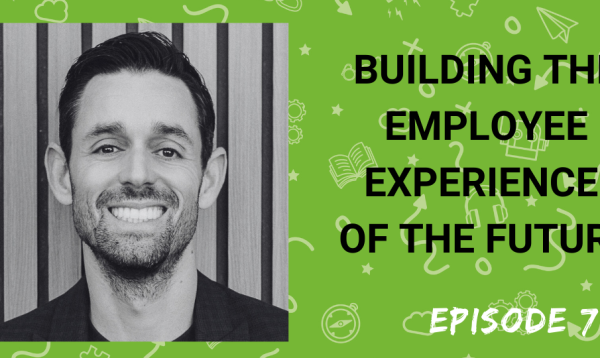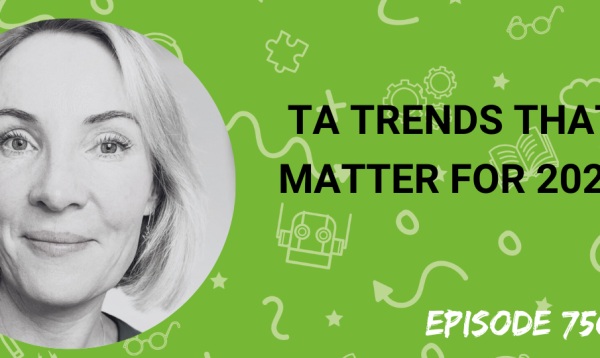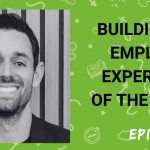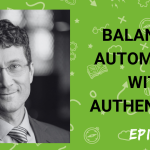The traditional approach to developing employer value propositions can often be complex and time-consuming. While this in-depth methodology might work well for large, complex organizations, many employers invest months or even years in exhaustive research and complex frameworks only to often end up with EVPs that sound remarkably similar to their competitors. At the same time, there’s growing pressure to activate employer brands quickly to address immediate talent needs, leaving organizations vulnerable to missed opportunities if they get caught in endless cycles of research and refinement.
So, how can companies develop distinctive EVPs that genuinely differentiate them while moving quickly enough to address urgent talent challenges?
My guest this week is Sam Monteath, founder of research and insights consultancy Reason Why, a research and insights consultancy. Sam shares valuable insights on how organizations can take a more agile approach to EVPs, avoiding the bloat and unnecessary complexity that often characterizes these projects.
In the interview, we discuss:
• [01:22] The key differences between employer brand, employer branding, and EVP
• [04:58] Why some EVP development processes have become unnecessarily complex
• [06:54] How organizations can balance speed with rigor in developing their EVPs
• [09:55] What is a minimum viable EVP?
• [12:28] Why so many EVPs sound similar, and how companies can genuinely differentiate themselves
• [15:38] How employer branding has evolved over the past decade
• [18:57] The role of AI and technology in transforming employer brand strategy
• [20:52] How AI is revolutionizing qualitative data analysis for EVP insights
• [22:21] The shift toward more dynamic, evolving EVPs connected to business objectives
• [23:53] What does the future of employer branding look like
Follow this podcast on Apple Podcasts
Follow this podcast on Spotify
00:00
Matt Alder
A lot of employer value propositions sound exactly the same. Growth opportunities, supportive culture, making a difference. In a world where people are searching for authentic differences between employers, organisations are spending time and money on EVPs that make them sound just like everybody else. Could there be a faster, more effective approach to creating employer value propositions that truly stand out? And keep listening to find out more. Support for this podcast is provided by shl, a talent intelligence company. From hiring and development to talent mobility and workforce planning, SHL’s assessment solutions and objective workforce insights take the guesswork out of people decisions. With more than 45 years of experience and proven results, SHL’s unique blend of science and data combined with predictive analytics and AI are helping HR teams to transform their talent strategy, uncover hidden skills and potential in people, and redefine career opportunities.
01:12
Matt Alder
SHL can help you optimize performance and decision making at every stage of the talent lifecycle. Visit SHL.com to find out more. There’s been more of scientific discovery, more of technical advancement and material progress in your lifetime and mine than in all the ages of history. Hi there. Welcome to episode 687 of Recruiting Future with me, Matt Alder. The traditional approach to developing employer value propositions can often be complex and time consuming. While this in depth methodology might work well for large, complex organizations, many employers invest months or even years in exhaustive research and complex frameworks only to end up with an EVP that sounds remarkably similar to their competition. At the same time, there’s a growing pressure to activate employer brands more quickly to address immediate talent needs, leaving organizations vulnerable to missed opportunities if they get caught in endless cycles of research.
02:26
Matt Alder
So how can companies develop distinctive EVPs that genuinely differentiate them while moving quickly enough to address urgent talent challenges? My guest this week is Sam Monteath founder of research and insights consultancy Reason Why. In our conversation, Sam shares valuable insights on how organizations can take a more agile approach to EVPs, avoiding the bloat and unnecessary complexity that often characterizes these projects. Hi Sam and welcome to the podcast.
02:58
Sam Monteath
Hi there Matt. Pleasure to be here.
03:00
Matt Alder
An absolute pleasure to have you on the show. Please could you introduce yourself and tell everyone what you do.
03:06
Sam Monteath
So I am Sam Monteath. I’ve spent quarter of a century now working in employer marketing and the second half of that phase I’ve been running Reason Why who are a research and insights consultancy. We help organizations understand what their employees want, what they think about working for them, what people on the outside perceive it might be like to work there, and all of the things that go into defining and refining their employer value proposition.
03:40
Matt Alder
Fantastic. Whenever I talk to anyone about employer value propositions and employer branding, I always think it’s good to start with some definitions because I think people don’t necessarily completely understand some of the things that go into this. And I know it’s kind of different in different countries. So from your perspective, give us the difference between employer branding and evp, and also talk us through a little bit about the process in terms of moving between them.
04:09
Sam Monteath
Yeah, by all means, Matt. And I’ll take this in a slightly different order. I think I see your employee brand as what people think it might be like to work for you. And I think it’s worth bearing in mind that most people don’t really know and they certainly don’t think about you unprompted, but if you prompt them to think about you as an employer, they’re going to sort of gather lots of perceptions of you, put them together in some order that may or may not reflect reality, and that’s your employer brand in their eyes. I see your EVP as being what you would like them to think, what you would like that perception to be in their mind, how you would like to. All those reference points that you pull together, it’ll come together into this, a big idea in their minds.
05:09
Sam Monteath
I think it’s really important to stress, you know, that perception that you’re aiming them to have should absolutely be based on the reality of working for you, but it should paint a distinctive and attractive picture. And I see employer branding as your efforts to move people from what they think now or what they might think if you ever prompted them to how you would like them to think about you as an employer. So ideally, that should be something really quite considered and structured and strategic to take them from the place you know they are at the minute or are likely to be more into your world. And therefore, when they’re actively looking for work, it’ll be an easy sell for you.
06:01
Sam Monteath
When they’re less actively looking for work, when they’re those famed passive candidates you might be front of mind, or they may have some positive associations that are going to align with what they’re looking for in their career.
06:14
Matt Alder
You talk a lot about agile EVPs. What do you mean by that?
06:19
Sam Monteath
I see a lot of sophistication in a lot of ways in the employer marketing industry. What that can lead to is incredibly detailed research projects that are there to define that EVP and to do so, as I say, in some really sophisticated ways to so Things can be incredibly targeted and incredibly well segmented and very often that’s good and appropriate, but sometimes it isn’t. And it’s worth bearing in mind that an EVP by itself really doesn’t do anything. It has to be activated. And most people, most of the time really want to be getting on with that activation as soon as they possibly can. There’s some kind of burning platform that they need to address.
07:15
Sam Monteath
And so I think what I’d like to see and what I’d like to encourage and get people to sort of reflect on and maybe challenge themselves at times is can we get to a point where we can be activating our employer brand and talking more actively to people quicker than maybe the sort of, some of the best practice has started to become?
07:37
Matt Alder
And I know that the length and the cost of some of these processes also kind of really put people off. Do you think that there’s kind of bloat in that or is that genuine best practice that works, but there are other ways to do it, things evolving to speed it up. How can we kind of fix that perception and get people to invest sort of more time and money in employer branding?
07:59
Sam Monteath
I think for a certain type of organization, certainly one that is doing quite different things, possibly in different areas, and therefore requiring lots of different types of people with different motivations to come in and work for them, and where that organization is probably fairly sort. Corporately careful, shall we say, and is therefore going to want to be 99.9% right with everything that it’s saying at all times to all people, then actually that real depth, real rigour in the process, that is going to take 12 months, 18 months to be absolutely sure about what they’re saying is absolutely appropriate. But I think those are the minority of organizations and probably quite the small minority of organizations, organisations. I think at times there is a certain safety and a certain comfort in wanting to sort of pursue ever more detail, ever more rigor in your research.
09:22
Sam Monteath
And therefore there’s a temptation from both organization and agency side to sort of keep going. I think maybe at times without the recognition that it’s diminishing returns, the more you ask the same kinds of things of the same kinds of people, the more of similar answers you’re going to get. There needs to be maybe a little more bravery to say, okay, we know enough at this point. I think the risk otherwise is, yes, it does become rather a, a potentially bloated project. It becomes rather easy for the cynic to say that actually this is the value that’s trying to be created here is for the person who’s creating the bloat in the project rather than for the organization.
10:16
Matt Alder
No, absolutely. And so this is a difficult question to answer, I know, but it’s almost like, you know, what’s the kind of minimum viable approach to this? What’s the, you know, how do you shorten that? What is it that’s kind of essential but can get people moving quickly.
10:34
Sam Monteath
It’s an interesting way to think about it and it’s a term that’s sort of gaining a bit of currency in the EVP world. I’ve seen a few people talk about sort of a minimum viable employer value proposition. And certainly the way I think about it is to be, you know, I talked before about those organizations being incredibly detail conscious and want to get sort of 99.9% assurance. I think there’s a point that you can get to quite a lot quicker of being 95% certain that you’re right and you know with extreme certainty that you’re not wrong. And I think you can do that in a number of ways.
11:18
Sam Monteath
And because I think most of what you would need to get to that stage probably exists in the knowledge within the organization, whether that’s coming out of marketing, whether that’s coming out of leadership, whether that’s coming out of hr, whether that’s coming out of some of the inputs from the people on the shop floor that you already possess. I think actually if you can put a lot of those things together, you can get to that being 95% right and not wrong point far sooner. I don’t think you need to stop at that point by any means, but by definition, by being 95% right, there’s more that you can do. And you know, that’s particularly in terms of that segmentation, that’s particularly in terms of understanding what the different audiences that you need to speak to are particularly driven by.
12:15
Sam Monteath
But I think that can all fall of that initial work that you’ve already done, which can then be out there in the wide world and being activated whilst you sort of pursue and refine and make things continually better.
12:31
Matt Alder
Following on from that, I think one of the things about this whole area is a lot of EVPs, particularly ones in the same talent sector, always sound very similar. And it’s, you know, I suppose that ultimately this is about standing out in those markets and being more attractive than your competitors. What can employers do to make sure that they are standing out I see.
12:57
Sam Monteath
Examples at times of EVPs that are obviously been through quite a rigorous process and that has enabled, and it’s given organizations definitely some bravery to do some really great and some really innovative and standout creative very often, but sometimes exactly as you said, the message behind that, the thing that it is eventually saying isn’t possibly differentiating themselves from their peers. And that’s a frustration of mine. It’ll work, I’m certain of it. These organizations aren’t daft and the creative is good enough and strong enough to get people to stand up and pay attention. But it’s not going to work as well as it could have done if it had the effect of making them truly stand out from their peer group. And I think that is a missed opportunity in terms of what they can do about that.
14:13
Sam Monteath
Of the four things that I always say an EVP enables you to be, it should enable you to be distinctive, attractive, realistic and consistent in everything that you say. I think that distinctiveness is the one that is hardest to fulfill. And I think that is often because people imagine there’s some sort of magic bullet, some sort of right combination of words that will make them truly unique. But I suppose the reality is if you’re a High street bank or does that exist anymore, a bank, in reality, you are quite similar to everybody else. So I think that distinctiveness is built up by a real combination of qualities that you possess that nobody else does. Nobody else will have exactly the same heritage that you have. Nobody else will have quite the same sort of reputational status that you do.
15:23
Sam Monteath
Nobody else will have, you know, exactly the same, you know, sort of midterm purpose that you have. And it is building up a picture of all of these, I think is the key to getting to that differentiation. And I think that is ultimately what will enable more EVPs and therefore more employers to stand out.
15:47
Matt Alder
You mentioned that you’ve been working in this space for a quarter of a century and things have obviously moved on and developed and all that kind of stuff. What surprised you most about how things have evolved over, you’d say, over the last sort of 10 years or so.
16:02
Sam Monteath
It’s certainly sort of surprising and notable the way in which employer branding as a language has been adopted. In many respects, there aren’t recruitment marketing managers anymore. They are all employer brand managers. That process of being out there and being present and placing job adverts, that stuff that still happens alongside some of those social media content and all of that way of being present is entirely adopted the language of employer branding, but maybe not so much some of the practice. It feels like a big EVP definition happens and then that is then fixed for a certain amount of time, three, four, five years, something like that. And in the meantime, it is the task of the employer brand team to churn out.
17:14
Sam Monteath
And I use that slightly pejoratively and I don’t mean to because there’s lots of communication to be done, but it feels quite a lot more like they’re doing individual sales, quite tactical work rather than the more strategic brand building. And I think maybe what’s missing a little bit is understanding some of the effect that’s having some of the testing or validation of some of that work, maybe having a slightly larger ambition to understand. You know, if ultimately what we’re trying to do is to change people’s perception of you as an employer, particularly so that you can tap into more of a passive market. I’m a little bit disappointed that there isn’t maybe more of that happening understanding actually. Have we shift anybody’s perception of how they think about us as an employee?
18:22
Matt Alder
Yeah, I think that’s a really good point because in many ways employer branding has become a very sort of catch all term to include everything from as you say, posting jobs to recruitment, marketing to whatever it is. I think it’s really important to kind of reiterate the, how vital it is to have that strategy. But behind it, the other thing I wanted to ask about was technology because you know, obviously every, every podcast in the world, every business podcast in the world has to mention the word AI at some point. So that’s my mention. Is, is technology playing a, a different role or evolving role in, in, in this space that you’re seeing or could it do in the future?
19:07
Sam Monteath
I, I think it’s, it’s certainly there in terms of the, I’m not going to say churn, but in the simplification and ease of production of a lot more of the content that does need to happen for good employer branding that is undoubtedly becoming much simpler and easier. And whether that’s written or video or audio or whatever it is that process through technology and with AI involved which is able to follow a brand voice, that’s becoming ever easier. I think, I think advances in that will keep happening and you know, will be interesting. The possibilities there are endless and fascinating.
20:04
Matt Alder
Yeah, I agree. And I think the ability already of AI to kind of do that almost that Lower level strateg and make it easy for people is going to be a game changer, I think. And I suppose that does lead on to the last question very nicely, which is, you know, what does the future look like? How do you think we’re going to be thinking about EVPs in three to five years time?
20:28
Sam Monteath
Actually, Matt, do you mind if I just roll back on the technology actually? Because yeah, I see a sort of another application as well which has been on the insights aspect of things. And quite often, you know, as I described, sort of EVP is this large and long process of sort of scooping up a lot of insights. And until really recently, if you wanted to talk to people at scale, you were probably restricted to a survey and you were really then a little bit restricted to the data, the pure numbers that were coming out of that survey to sort of truly understand what was going on. AI has now given us the opportunity in a very short space of time to really accurately understand qualitative data at scale and in short time as well.
21:25
Sam Monteath
And I think so as an input to any kind of EVP project, I think that’s absolutely invaluable and I’ve used it extensively since the moment, you know, that sort of potential became clear. But I think as we go on and would like to start testing how things are landing, whether we are shifting perceptions, what this bit of content or campaign is making people feel, I think that will become ever more valuable.
22:01
Matt Alder
And sifting back to that, to the question about three to five years time, where is it all taking us, do you think?
22:07
Sam Monteath
I do definitely see an evolution in both language and thinking about employer value proposition. And that’s now starting to be adopted in the sense of employee experience, in terms of employee engagement and starting to tap over into sort of organizational design as well in the sense that if what we need from our employees, we’re probably going to demand more of them. Actually, what we need from those employees might be quite different because this organization might need to shift quite quickly. It might even be that we need entirely different people. More often then I see the proposition that you’ve got to employees needs to keep moving much more quickly than it has done. And it is starting then to tie much closer to the organizational objectives.
23:19
Sam Monteath
A thinking that we’re not going to be able to do the things that we would like to do unless we can keep evolving this proposition to people to keep them engaged, to keep answering their needs, or to maybe answer some different needs entirely. We’ve got to think about this as something that is absolutely ever evolving.
23:40
Matt Alder
Thank you very much for talking to me.
23:41
Sam Monteath
No problem. It’s been a pleasure, Matt.
23:44
Matt Alder
My thanks to Sam. You can follow this podcast on Apple Podcasts on Spotify or wherever you get your podcasts. You can search all the past episodes on recruitingfuture.com on that site. You can also subscribe to our weekly newsletter, Recruiting Future Feast, and get the inside track on everything that’s coming up on the show. Thanks very much for listening. I’ll be back next time and I hope you’ll join me.








